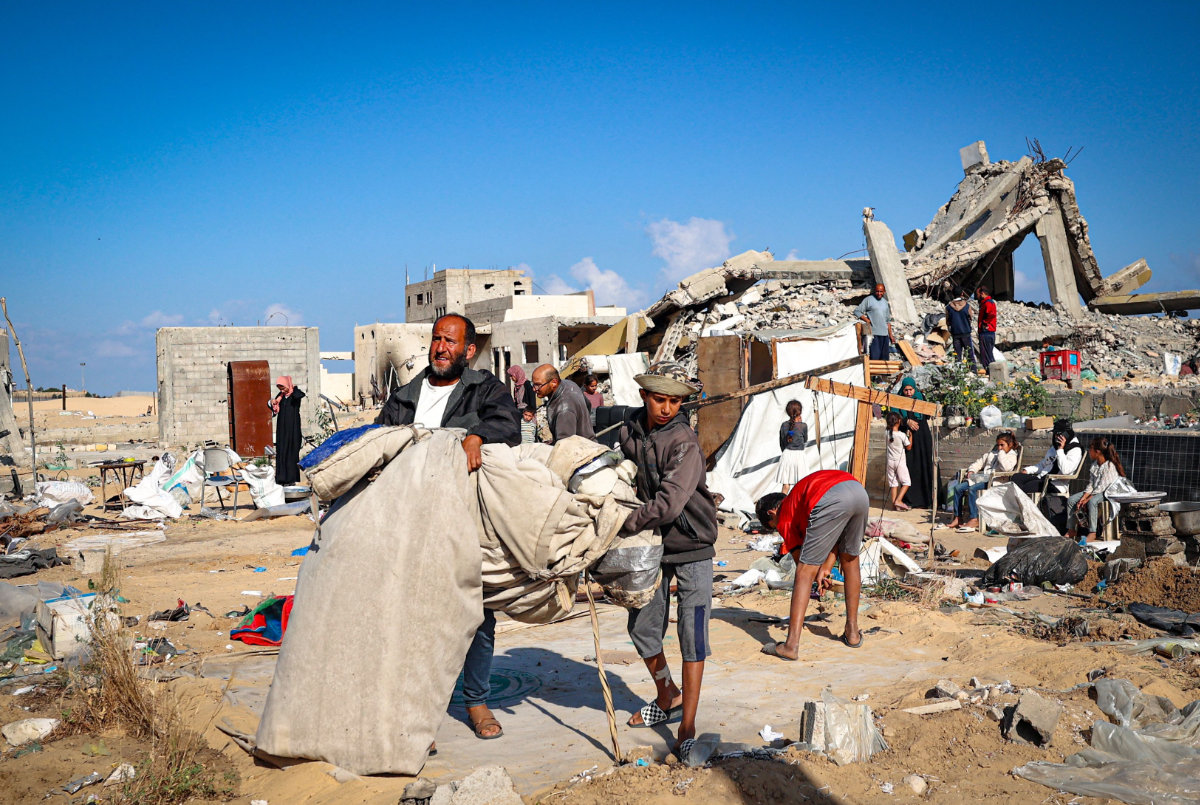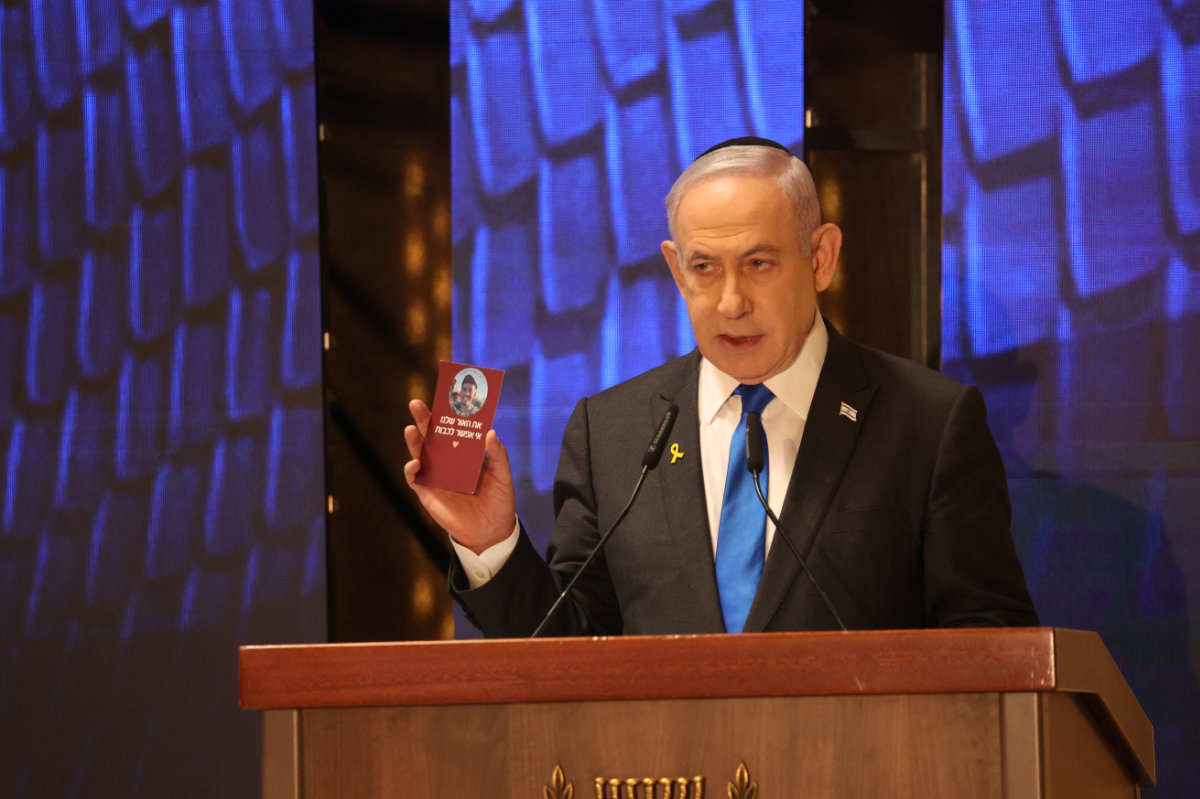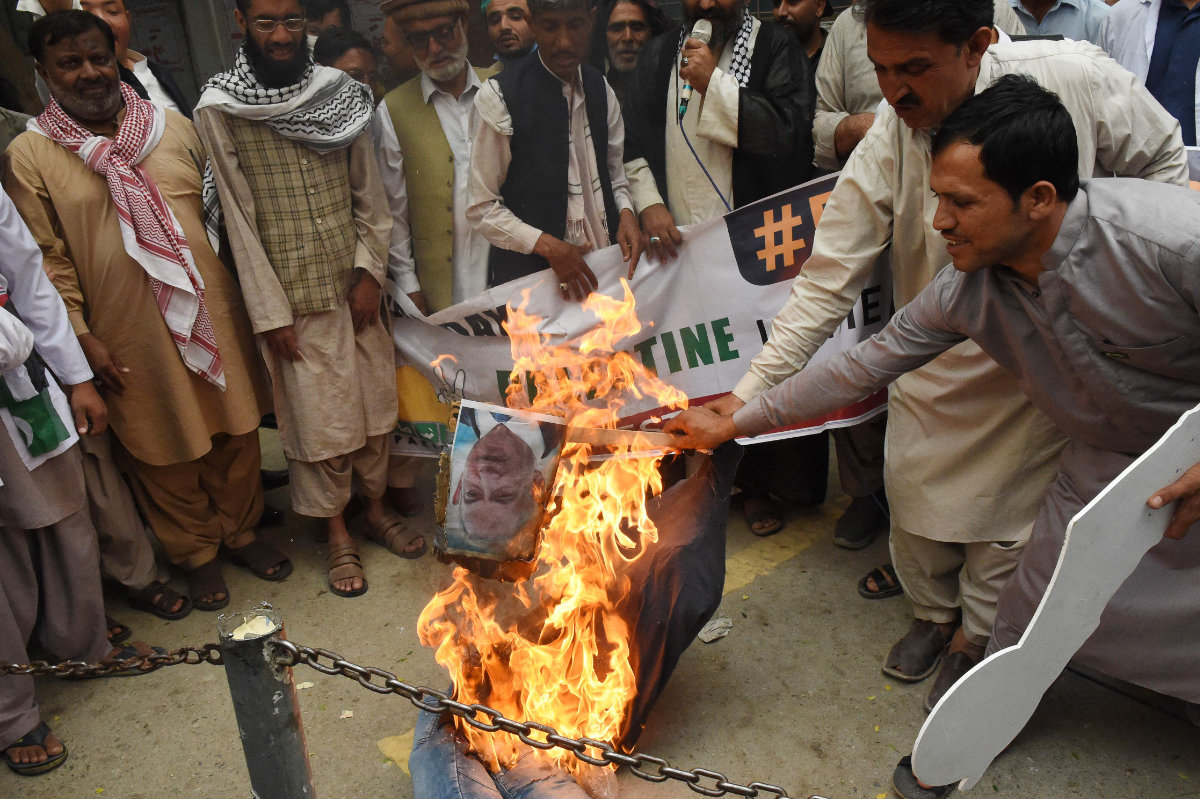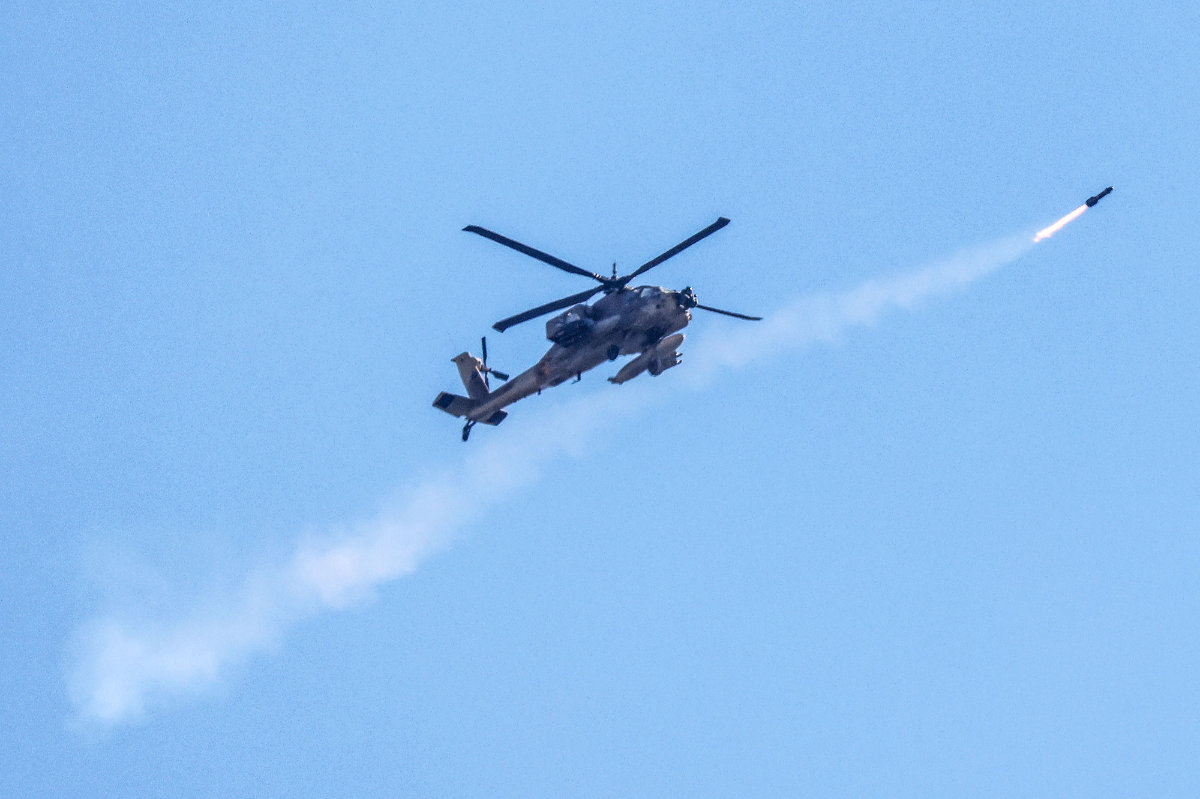Warning sirens heard in villages near the Gaza Strip border, according to Israeli sources.
Developing...

BANSKA BYSTRICA, Slovakia: Slovak Prime Minister Robert Fico is no longer in a life-threatening condition after he was shot in an assassination attempt when leaving a government meeting on Wednesday, a government minister said.
The gunman shot Fico, 59, five times, initially leaving the prime minister in critical condition and undergoing surgery hours later on Wednesday evening.
“I was very shocked ... fortunately as far as I know the operation went well — and I guess in the end he will survive ... he’s not in a life-threatening situation at this moment,” Slovak Deputy Prime Minister and Environment Minister Tomas Taraba told the BBC’s Newshour.
Taraba said one bullet went through Fico’s stomach and a second hit a joint.
News outlet Aktuality.sk cited an unnamed source saying Fico was out of surgery and in stable condition.
Defense Minister Robert Kalinak told a news briefing hours earlier that Fico had suffered “serious polytrauma” after several shot wounds.
Interior Minister Matus Sutaj Estok had said earlier that Fico was in a life-threatening condition while he remained in the operating room.
“This assassination (attempt) was politically motivated and the perpetrator’s decision was born closely after the presidential election,” Sutaj Estok said, referring to an April election won by a Fico ally, Peter Pellegrini.
The shooting in the central Slovak town of Handlova, which Slovak media said was carried out by a 71-year-old man, stunned the small central European nation and drew international condemnation.
Slovakia, a member of NATO and the European Union, has little history of political violence. Russian President Vladimir Putin and US President Joe Biden joined Slovakia’s EU partners in expressing shock and condemnation of the shooting.
The country of 5.4 million has seen polarized political debate in recent years, including the hard-fought presidential election last month that helped tighten Fico’s grip on power.
Since returning as prime minister last October, Fico has shifted policy quickly. Opposition critics call it a power grab.
His government has scaled back support for Ukraine while opening dialogue with Russia, sought to weaken punishments for corruption and dismantled a special prosecutor’s office, and is revamping the RTVS public broadcaster despite calls to protect media freedom.
Fico has long been critical of Slovakia’s mainstream media, refusing to speak to some outlets. Members of his party blasted media and opposition actions in recent months.
“I ask all to stop piling attacks, expressions of hate, on social networks, in the media, which are aimed at that or another political camp, regardless if it concerns the (government) coalition or the opposition,” Sutaj Estok said.
After the attack, Fico was rushed to hospital in Handlova where he had been chairing a government meeting. He was then transported by helicopter to regional capital Banska Bystrica for urgent treatment, it said, adding that his condition was too serious for him to be taken to Bratislava.
A Reuters witness heard shots as Fico exited a building to shake hands with a crowd of people who had been waiting to greet him. Police then wrestled a man to the ground.
Slovak news media reported the shooter was a former security guard at a shopping mall, an author of three collections of poetry and a member of the Slovak Society of Writers. News outlet Aktuality.sk cited his son as saying his father was the legal holder of a gun license.
“I have absolutely no idea what my father intended, what he planned, what happened,” it quoted the son as saying.
Broadcaster TA3 reported the leftist prime minister had been hit in the abdomen in the attack.
“I don’t think I will wake up from this,” 66-year-old Lubica Valkova told reporters on the scene. “This kind of thing just can’t happen in Slovakia.”
Veteran leader
Fico, a dominant force in Slovakia for two decades, has drawn criticism for taking a more pro-Russian stance in the Ukraine war.
Describing the shooting as a “monstrous” crime, Putin said in a telegram sent to Slovakia’s President Zuzana Caputova: “I know Robert Fico as a courageous and strong-minded man. I very much hope that these qualities will help him to survive this difficult situation.”
Biden offered US help to Slovakia, saying in a statement: “We condemn this horrific act of violence.”
Slovakia’s biggest opposition party Progressive Slovakia called off a planned protest and called for restraint to avoid escalating tensions. Parliament suspended debate indefinitely after the attack.
In his career, Fico has moved between the pro-European mainstream and nationalistic positions opposed to EU and US policies. He has also shown a willingness to change course depending on public opinion or changed political realities.
An admirer of Hungary’s Prime Minister Viktor Orban, Fico has grown increasingly critical of Western support for Ukraine in its war with invading Russian forces.
Fico was forced to resign as premier amid mass protests in 2018 triggered by the contract killing of Jan Kuciak, a journalist who had been investigating high-level corruption. Those protests exacerbated divisions in Slovak society that still linger.

United Nations, US: Residents of conflict-hit Sudan are “trapped in an inferno of brutal violence” and increasingly at risk of famine due to the rainy season and blocked aid, the UN’s humanitarian coordinator for the country warned Wednesday.
Tens of thousands of people have died and millions have been displaced since war broke out in April 2023 between the army and the paramilitary Rapid Support Forces (RSF).
“Famine is closing in. Diseases are closing in. The fighting is closing in and there’s no end in sight,” Clementine Nkweta-Salami told a press conference.
The grim situation is only expected to worsen, with “just six weeks before the lean season sets in, when food becomes less available, and more expensive.”
Noting that more than four million people are facing potential famine, Nkweta-Salami added that the onset of the country’s rainy season means that “reaching people in need becomes even more difficult.”
The area’s planting season also “could fail if we aren’t able to procure and deliver seeds for farmers,” she said.
And “after more than a year of conflict, the people of Sudan are trapped in an inferno of brutal violence.”
“In short, the people of Sudan are in the path of a perfect storm that is growing more lethal by the day,” Nkweta-Salami warned, adding that the humanitarian community needs “unfettered access to reach people in need, wherever they are.”
The United Nations has expressed growing concern in recent days over reports of heavy fighting in densely populated areas as the RSF seeks control of El-Fasher, the last major city in the western Darfur region not under its control.
“Right now the humanitarian assistance they rely on can’t get through,” Nkweta-Salami said.
More than a dozen UN trucks loaded with medical equipment and food, which left Port Sudan on April 3, have still not reached El Fasher, she said, “due to insecurity and delays in getting clearances at checkpoints.”

BEIJING: Russia’s President Vladimir Putin landed Thursday in Beijing for a two-day state visit to China, in a show of unity between the authoritarian allies as Moscow presses forward with a new offensive in Ukraine.
Putin’s visit comes as Russia has become more economically dependent on China following Moscow’s full-scale invasion of Ukraine more than two years ago.
On the eve of the visit, Putin said in an interview with Chinese media that the Kremlin is prepared to negotiate over the conflict in Ukraine. “We are open to a dialogue on Ukraine, but such negotiations must take into account the interests of all countries involved in the conflict, including ours,” Putin was quoted as saying by the official Xinhua News Agency.
The Russian leader’s two-day trip comes as his country’s forces have pressed an offensive in northeastern Ukraine’s Kharkiv region that began last week in the most significant border incursion since the full-scale invasion began, forcing almost 8,000 people to flee their homes.
Along with Moscow’s efforts to build on its gains in the nearby Donetsk region, the 2-year-old war has entered a critical stage for Ukraine’s depleted military that is awaiting new supplies of anti-aircraft missiles and artillery shells from the United States.
“We have never refused to negotiate,” Putin was quoted as saying by Xinhua. “We are seeking a comprehensive, sustainable and just settlement of this conflict through peaceful means. We are open to a dialogue on Ukraine, but such negotiations must take into account the interests of all countries involved in the conflict, including ours.”
Ukrainian President Volodymyr Zelensky has said any negotiations must include a restoration of Ukraine’s territorial integrity, the withdrawal of Russian troops, the release of all prisoners, a tribunal for those responsible for the aggression, and security guarantees for Ukraine.
China claims to take a neutral position in the conflict, but has backed Moscow’s contentions that Russia was provoked into attacking Ukraine by the West, despite Putin’s public avowals of his desire to restore Russia’s century-old borders as the reason for his assault.
Putin has blamed the West for the failure of negotiations in the opening weeks of the war and praised China’s peace plan for Ukraine that would allow Moscow to cement its territorial gains.
“Beijing proposes practicable and constructive steps to achieve peace by refraining from pursuing vested interests and constant escalation of tensions, minimizing the negative impact of the conflict on the global economy,” he had said.
Putin said a Chinese proposal in 2023, which Ukraine and the West rejected, could “lay the groundwork for a political and diplomatic process that would take into account Russia’s security concerns and contribute to achieving a long-term and sustainable peace.”
The Kremlin said in a statement that during their talks this week, Putin and Chinese leader Xi Jinping will “have a detailed discussion on the entire range of issues related to the comprehensive partnership and strategic cooperation and determine the new directions for further development of cooperation between Russia and China and also have a detailed exchange of opinions on the most acute international and regional issues.”
The visit furthers the effort by China and Russia to topple the US-led Western democratic order in favor of a more authoritarian model that crushes political opposition, human rights and freedom of speech. Putin began a fifth term in office this month.
Speaking Tuesday in the upper house of Russian parliament, Foreign Minister Sergey Lavrov said Moscow and Beijing are “objectively interested in maintaining our lead in efforts to establish a more fair and democratic world order.”
“Russia and China aren’t alone in their efforts to reform an international system and help establish a multipolar global order,” he said.
Lavrov noted that the “duet of Moscow and Beijing plays a major balancing role in global affairs,” adding that “the Russian president’s forthcoming visit to (China) will strengthen our joint work.”
Moscow has forged increasingly close ties with Beijing as the war has dragged into a third year, diverting the bulk of its energy exports to China and relying on Chinese companies for importing high-tech components for Russian military industries to circumvent Western sanctions.
The Russia-China military ties have also strengthened. They have held a series of joint war games in recent years, including naval drills and patrols by long-range bombers over the Sea of Japan and the East China Sea. Russian and Chinese ground forces also have deployed to the other country’s territory for joint drills.
China remains a major market for Russian military, while also massively expanding its domestic defensive industries, including building aircraft carriers and nuclear submarines.
Putin has previously said that Russia has been sharing highly sensitive military technologies with China that helped significantly bolster its defense capability. In October 2019, he mentioned that Russia was helping China to develop an early warning system to spot ballistic missile launches — a system involving ground-based radar and satellites that only Russia and the US possessed.

THE HAGUE: South Africa will ask the top UN court on Thursday to order a halt to the Rafah offensive as part of its case in The Hague accusing Israel of genocide in the Gaza Strip.
The hearings at the International Court of Justice, also known as the World Court, come after South Africa last week asked for additional emergency measures to protect Rafah, a southern Gaza city where more than a million Palestinians have been sheltering.
It also asked the court to order Israel to allow unimpeded access to Gaza for UN officials, organizations providing humanitarian aid, and journalists and investigators. It added that Israel has so far ignored and violated earlier court orders.
On Thursday, South Africa will present its latest intervention seeking emergency measures starting at 3 p.m.(1300 GMT).
Israel, which has denounced South Africa’s claim that it is violating the 1949 Genocide Convention as baseless, will respond on Friday. In previous filings it stressed it had stepped up efforts to get humanitarian aid into Gaza as the ICJ had ordered.
Gilad Erdan, Israel’s ambassador to the United Nations told Army Radio on Wednesday the short notice the court gave for the hearings did not allow sufficient legal preparation, adding that was “a telling sign.”
The Israel-Hamas war has killed nearly 35,000 people in Gaza, according to health authorities there. About 1,200 people were killed in Israel and 253 taken hostage on Oct. 7 when Hamas launched the attack that started the war, according Israeli tallies.
South Africa accuses Israel of acts of genocide against Palestinians. In January, the court ordered Israel to ensure its troops commit no genocidal acts against Palestinians in Gaza, allow in more humanitarian aid and preserve any evidence of violations.
The hearings on May 16 and 17 will only focus on issuing emergency measures, to keep the dispute from escalating. It will likely take years before the court can rule on the merits of the case.
The ICJ’s rulings and orders are binding and without appeal. While the court has no way to enforce them, an order against a country could hurt its international reputation and set legal precedent.

RAFAH, Palestinian Territories: Israeli Prime Minister Benjamin Netanyahu on Wednesday insisted there was no “humanitarian catastrophe” in Rafah, even as hundreds of thousands fled the south Gaza city amid intense fighting.
Hamas meanwhile insisted it would take part in any decision on the post-war government of Gaza as Palestinians marked the 76th anniversary of the “Nakba,” when around 760,000 Palestinians fled or were driven from their homes during the 1948 creation of Israel.
Israeli forces have bombed Hamas militants around Gaza’s far-southern city of Rafah, but clashes have also flared again in northern and central areas which Israeli troops first entered months ago.
The upsurge in urban combat has fueled US warnings that Israel, which launched its war after the October 7 Hamas attacks, risks being bogged down in years of counterinsurgency.
But despite previous threats by US President Joe Biden to withhold some arms deliveries over Netanyahu’s insistence on attacking Rafah, his administration informed Congress on Tuesday of a new $1 billion weapons package for Israel, official sources told AFP.
The European Union urged Israel to end its military operation in Rafah “immediately,” warning failure to do so would “inevitably put a heavy strain” on ties with the bloc.
But even as he announced that hundreds of thousands had been “evacuated,” Netanyahu insisted there was no humanitarian crisis in Rafah.

“Our responsible efforts are bearing fruit. So far, in Rafah, close to half a million people have been evacuated from the combat zones. The humanitarian catastrophe that was spoken about did not materialize, nor will it,” he said.
The United Nations agency for Palestinian refugees, UNWRA, meanwhile said “600K people have fled Rafah since military operations intensified.”
Nakba Day
The sight of desperate families carrying scant belongings through the ruins of war-scarred Gaza cities has evoked for many the events of the 1948 Nakba which translates from Arabic as “catastrophe.”
Hamas declared in a Nakba Day statement that “the ongoing suffering of millions of refugees inside Palestine and in the diaspora is directly attributed to the Zionist occupation.”
Hamas chief Ismail Haniyeh insisted meanwhile that the militant movement will be involved in deciding post-war rule in Gaza along with other Palestinian factions.
“We say that the Hamas movement is here to stay ... and it will be the movement and all national (Palestinian) factions who will decide the post-war rule in Gaza,” Haniyeh said in a televised address for Nakba.
He also said the fate of truce talks was uncertain because of Israel’s “insistence on occupying the Rafah crossing and on its expansion of the aggression” in the Palestinian territory.
“Any agreement must ensure a permanent ceasefire, comprehensive withdrawal (of Israeli forces) from all sectors of the Gaza Strip, a real deal for exchange of prisoners, the return of displaced persons, reconstruction and lifting the siege” of Gaza, Haniyeh said.
Thousands marched to mark the day in cities across the Israeli-occupied West Bank, waving Palestinian flags, wearing keffiyeh scarves and holding up symbolic keys as reminders of long-lost family homes.
Netanyahu has vowed to destroy Hamas and bring home hostages still held in Gaza.

In a Wednesday interview with CNBC, Netanyahu addressed the tensions with Biden over the offensive, saying: “Yes, we do have a disagreement on Gaza. Rather, on Rafah. But we have to do what we have to do.”
Washington has also repeatedly urged Israel to work on a post-war plan for Gaza and supports the goal of a two-state solution, which Netanyahu and his far-right allies strongly oppose.
US State Department spokesman Vedant Patel said without a political plan, Palestinian militants “will keep coming back” trapping all sides in “this continued cycle of violence.”
Israeli Defense Minister Yoav Gallant on Wednesday said he would “not agree to the establishment of an Israeli military administration in Gaza, Israel must not have civilian control over the Gaza Strip.”
The war broke out after Hamas’s October 7 attack on southern Israel which resulted in the deaths of more than 1,170 people, mostly civilians, according to an AFP tally of Israeli official figures.

The militants also seized about 250 hostages, 128 of whom Israel estimates remain in Gaza, including 36 the military says are dead.
Israel’s military retaliation has killed at least 35,233 people, mostly civilians, according to the Gaza health ministry, and an Israeli siege has brought dire food shortages and the threat of famine.
Clashes continue
The Israeli military said Wednesday its aircraft had “struck and eliminated approximately 80 terror targets” including military compounds, missile launchers and weapons depots.
It also reported battles in eastern Rafah and in Jabalia in northern Gaza, where it said it had killed militants, adding troops were also fighting in the Zeitun area.

Hamas’s armed wing also reported its fighters were clashing with troops in the Jabalia area, much of which has been reduced to rubble.
At least five people were killed, including a woman and her child, in two Israeli air strikes on Gaza City overnight, Gaza’s civil defense agency said.
At the city’s Al-Ahli hospital, a wounded man, his bare chest smeared with blood, lay on a cot while outside several men placed a shrouded corpse in the shade of a tree.
Sporadic aid deliveries into Gaza by truck have slowed to a trickle since Israeli forces took control of the Gaza side of the Rafah crossing with Egypt last week.
A UK delivery of 100 tons of temporary shelter kits left Cyprus Wednesday on its way to a US-built pier in Gaza, Britain said.
Another convoy carrying humanitarian relief goods was ransacked by Israeli right-wing activists on Monday after it had crossed from Jordan through the West Bank.